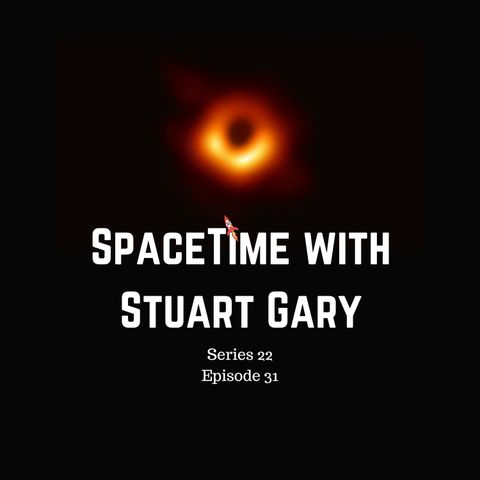The First Direct Image of a Black Hole

Apr 24, 2019 ·
32m 29s
SpaceTime Series 22 Episode 31 The astronomy and space science news podcast.Stream podcast episodes on demand from www.bitesz.com/spacetime (mobile friendly). *Astronomers capture the first ever direct image of a black...
show more
SpaceTime Series 22 Episode 31 The astronomy and space science news podcast.Stream podcast episodes on demand from www.bitesz.com/spacetime (mobile friendly). *Astronomers capture the first ever direct image of a black holeAstronomers have successfully captured one of the most important pictures in scientific history – an actual image of a supermassive black hole. This breakthrough was announced in a series of six papers published in a special issue of The Astrophysical Journal Letters, and at a co-ordinated series of special press conferences held simultaneously around the globe. *Mercury has a solid inner coreScientists have determined that the planet Mercury has a solid metallic inner core similar in size to the Earth’s. The findings reported in the journal Geophysical Research Letters, help scientists better understand Mercury while at the same time offering clues about how the solar system formed and how rocky planets evolve over time. *Preparing CHEOPSThe European Space Agency’s mission to study strange worlds orbiting distant stars has moved a step closer to launch with the spacecraft now fully assembled and tested in preparation for launch. The CHaracterising ExOPlanet Satellite or CHEOPS has finally left the cleanroom in Switzerland and is now in Madrid for further launch preparations. Youtube video URL: http://spacetimewithstuartgary.tumblr.com/post/183443264918 *If at first you don’t succeedDespite much hope, the private Israeli bid to land a spacecraft on the surface on the Moon has failed. But like the proverbial phoenix rising from the ashes, supporters from around the world have rallied around the company Space IL -- determined to try again. *The Science ReportScientists at Tel Aviv University successfully print the world's first 3D vascularised engineered heart. Some four thousand European Alpine glaciers will lose half their ice by 2050.An El Niño which began forming late last year is now fully entrenched across the Pacific Ocean.Fossils from a previously unknown member of the human family tree discovered in the Philippines.Why it’s better to keep your cats indoors.Moves to stop claims by promoters of alternative medicines – but is it enough? For enhanced Show Notes including photos to accompany this episode, visit: http://www.bitesz.com/spacetimeshownotes To receive the Astronomy Daily Newsletter free, direct to your inbox...just join our mailing list at www.bitesz.com/mailinglist Learn more about your ad choices. Visit megaphone.fm/adchoices
See acast.com/privacy for privacy and opt-out information.
show less
See acast.com/privacy for privacy and opt-out information.
Information
| Author | bitesz.com |
| Website | - |
| Tags |
-
|
Copyright 2024 - Spreaker Inc. an iHeartMedia Company
